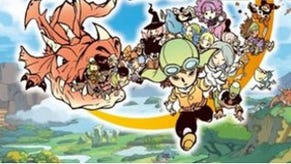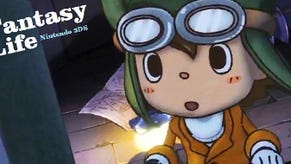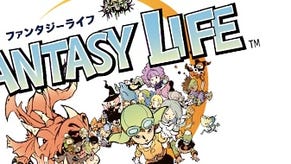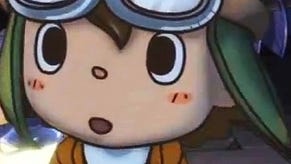Fantasy Life 3DS Review: An MMO RPG That's Not Particularly Massive, Multiplayer, or Online
Level-5's addictive role-playing odyssey distills the essence of games like EverQuest and Final Fantasy XIV into a portable experience fit for one.
This article first appeared on USgamer, a partner publication of VG247. Some content, such as this article, has been migrated to VG247 for posterity after USgamer's closure - but it has not been edited or further vetted by the VG247 team.
Lead Reviewer: Jeremy Parish, Editor-in-Chief
Jean-Paul Satre once wrote, "Hell is other people." Massively multiplayer online role-playing games are other people, too, which is probably why the idea of an MMO sounds so hellish to me.
It's not that I don't like other people. But I spend my days coordinating and planning and making arrangements with other people, and the idea of sitting down to unwind and having to do all of that all over again stresses me right out. You play with other people, you need to play with other people, and when I try it just makes everyone unhappy.
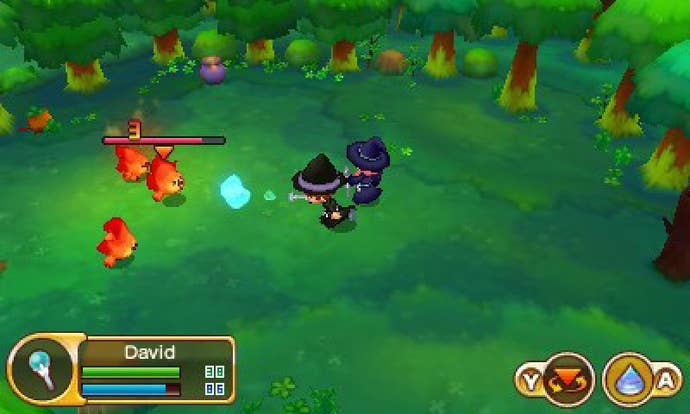
The problem, ultimately, is that I'm not very good at staying on-task in video games. I wander over to some oblique corner to poke around while everyone else is advancing on a goal marker. I set out on one mission and decide halfway through to complete some other objective instead. I take a bit of damage in a big battle and run away to build some levels by doing other tasks. If I try to team up with other people for long, either I go about my usual way of doing (or rather, not doing) things and everyone else gets annoyed, or else I restrain myself and get stressed out from not being able to wander at my own pace. It's just bad news for everyone.
Thank goodness for games like Fantasy Life, then. Sure, Fantasy Life has a multiplayer component — you can go out and adventure with your friends if you like, and of course you can do the usual Street Pass shenanigans as well — but really, it's built from the ground up as a solo experience. On the surface, it resembles a life sim a la Animal Crossing or Harvest Moon, but it's actually far more freeform and less limited in scope than either of those series. Fantasy Life's central narrative thread is that of a typical Japanese RPG, with cosmic companions and world-saving tasks to be completed; but unlike, say, Bravely Default, the emphasis skews from combat and killing over to more mundane tasks.
The best way to explain Fantasy Life is that it encompasses the entirety of the RPG ecosystem and makes the associated tasks available to the player to pursue at their whim. You can be a soldier or mage and play the adventure straight, but most of the dozen classes — "Lives" — available are much less about bold heroism and put the spotlight instead on supporting tasks. You don't have to buy expensive armor upgrades; you can choose work as a blacksmith and create your own for much less money (then subsidize the upgrades by selling off your surplus creations). Of course, buying raw materials for smithing can be expensive, so why not take up the mantle of miner and woodcutter as well to source your own materials? Healing items such as food are much cheaper if you make them yourself as a chef, and you can save even more money by spending some time learning how to fish as an angler.
In other words, this particular rabbit hole goes as far down as you'd willing to pursue it. All told, Fantasy Life offers 12 different Life classes, the Final Fantasy job system made literal, and you can explore each role in as much depth as you like. As long as you're not engaged in an active story or guild quest, you can switch roles to any other Life. And the process proves to be pleasantly painless; once you complete the initiation process for your initial Life choice, you can bypass the introductory quest for any subsequent Life you adopt and jump immediately to active status.
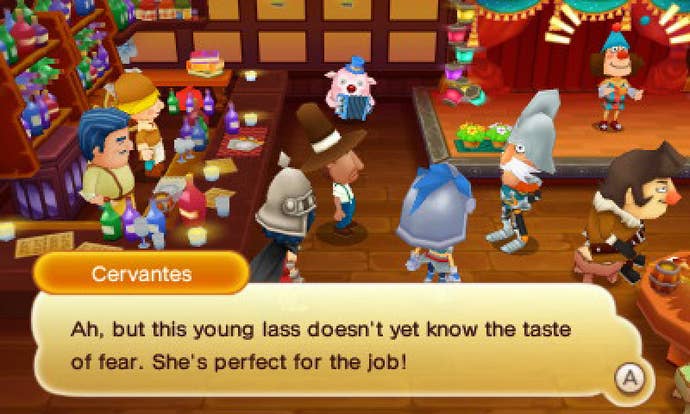
While some Life pairings feel more complementary than others — chef and paladin have much less to do with one another than, say, woodcutter and carpenter — they all feed back into the same story. Fantasy Life isn't a life simulation with daily tasks but rather an RPG with an overarching narrative, and the tasks you take on the side may distract you from the plot but the skills you learn as you study a Life nevertheless feed back into the core adventure by giving you access to better skills and equipment and items.
Again, it's all highly reminiscent of MMORPGs, but without the need to party up and cooperative with other players. You can certainly do so if you like, and with multiple people teamed up together Fantasy Life plays for all the world like those early screenshots of Dragon Quest IX, from back when it was going to be an action RPG. That version never quite panned out thanks to fan backlash, and I have a sneaking suspicion that part of the motivation behind Fantasy Life's existence resulted from the team working on DQIX wanting to make good on their abandoned vision.
The DQIX connections run much deeper than the multiplayer combat, though. The entire premise of Fantasy Life's story will sound suspiciously familiar to anyone who played the most recent localized numbered Dragon Quest: It involves beings who fell from the heavens. A tiny, flying, female character with a sassy attitude makes herself your mute protagonist's permanent companion and mouthpiece. Your generic hero or heroine's gear selections change their appearance. And most of all, there's that addictive gathering and crafting system....
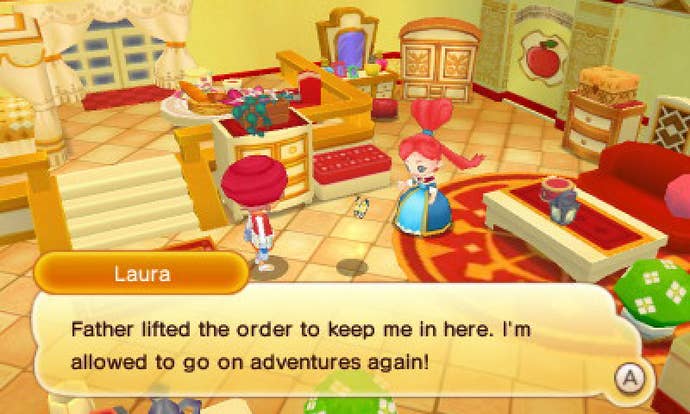
Given how much I loved DQIX, I certainly have no complaints. While Fantasy Life can be a bit grindy in places — most egregiously in the way all the crafting jobs use the exact same minigames to allow you to build stuff — it offers such a ridiculous array of things to do that the only reason you'd ever find yourself bored by the game is if you dislike the basic premise. And I could see Fantasy Life not appealing to everyone, especially in terms of its structure; those who prefer a more linear or focused RPG experience will find its meandering openness frustrating.
It's also a far cry from the Final Fantasy-style "journey around the world" RPG design, in that the game only encompasses a handful of cities and the areas surrounding them. As the title suggests, you're meant to set up a life for yourself in these places and explore them slowly, taking on tasks for the town folk and supplementing your adventure at your own pace — provided that pace isn't particularly brisk or urgent. Fantasy Life offers a slow-burn experience, with tons of chatty NPCs and an logistical need to pursue several different threads of experience in order to advance properly. It's an RPG where combat is a means to an end, but not the only means, nor the most effective. You'll roam and fight and struggle to drag captured bounties back to town, but even as you venture out into monster-infested fields you'll have an eye open for plants to gather, trees to fell, ore to mine, and fish to snag.
For fans of many MMOs, of course, none of this will seem particularly revelatory. But I don't know that any other single-player-focused adventure has managed to combine life sim and action RPG quite so effectively — not even the Rune Factory series. Fantasy Life offers an unusually relaxed take on the RPG, the kind of game you could totally lose yourself in, by design. You don't have to master any aspect of the game in order to "beat" it, but it's so addictive and good-spirited that you may find yourself compelled to do so anyway.
Second Opinion: Bob Mackey, Senior Writer
As a longtime lover of Harvest Moon and its related spin-offs, I must say Fantasy Life is my kind of game.
If you're going into Fantasy Life expecting the same hooks as Animal Crossing, though, you might be a little disappointed. While you're given a lot of freedom within the world of Reveria, Level-5's take on the life sim genre drops the primary focus on stuff-collecting and essentially acts as a portable MMORPG—but without that whole "MMO" part. In fact, the general design of Fantasy Life reminds me a lot of Final Fantasy XIV, which is the only MMO I've stuck with, simply because it gives me the chance to effortlessly switch between many different activities without much hassle. Fantasy Life doesn't pull this off quite as well as FFXIV, but the game's focus on repetitive tasks rarely grows tedious, since you're given many choices as to which kind of repetitive tasks you'd like to perform. (And I mean that completely without sarcasm.)
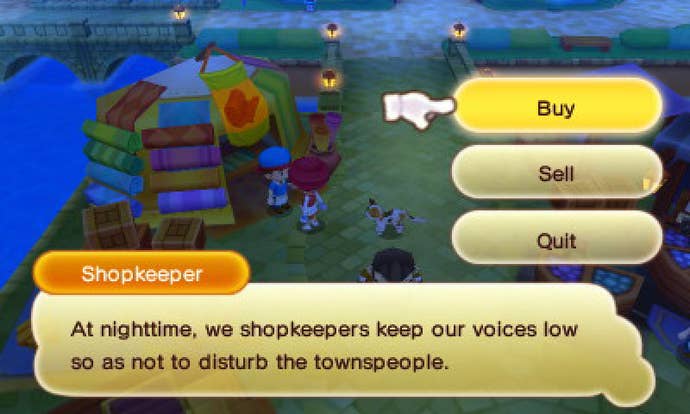
And Fantasy Life's quest structure feels very much like that of an MMO, too: Accomplishing tasks brings about the same Type-A joys of gradually working your way through a checklist. What you're asked to do never gets too inventive—defeat X monsters, make X items, collect X amount of resources—but Fantasy Life does an excellent job of jabbing at your brain's pleasure center by stringing you along with a progression of fun-sized rewards. Nearly everything you do in the game is meaningful in some way, so popping your 3DS open for 10 minutes of play means you can at least put a dent in one of the many categories that feeds on experience points. Normally, the MMO experience requires the commitment of sitting down at a PC, logging in, downloading updates, and loading the actual game, so it's great to be able to get the same kicks almost instantly, and on the go at that. Oh, and without paying $14.99 a month.
For the most part, Fantasy Life makes switching between its various classes (or "Lives") very intuitive—which is good, since many of these roles complement one another. After playing eight hours as an Angler, I switched to the Cook role, skipped the needless tutorials, and ranked this new class up incredibly quickly thanks to all of the resources I gained in my past Life. I will say that the combat roles don't offer this same speediness, mostly because their quests involve defeating monsters you've probably slayed dozens of times if you started in a crafting or resource-gathering Life. After switching Lives once again, this time to the Mercenary role, it annoyed me that most of my Life-specific monster-hunting quests gave me completely identical instructions to ones I completed in the past. Since you can do combat in any chosen Life, the ones focused on fighting feel a bit redundant, so I'm not necessarily motivated to explore them. Heck, I was fighting off giant beasts as a humble fisherman and did just fine.
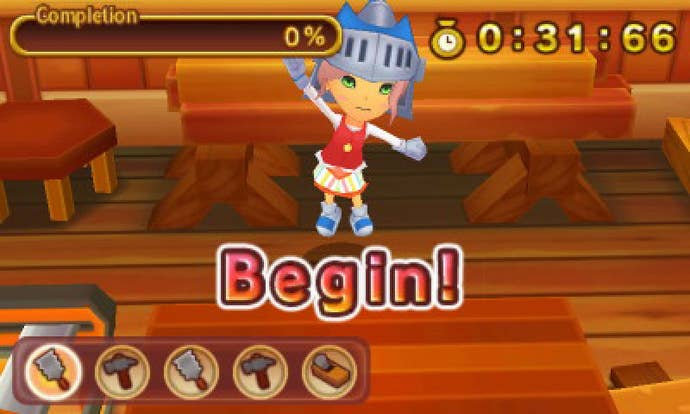
I'm having a lot of fun with Fantasy Life, and I'm a bit afraid of how much free time this thing is going to devour over the coming months, but it's an experience in need of some optimization. While it provides some essential, time-saving shortcuts (like the ability to warp to important locations), Fantasy Life can get a bit wordy at times, and the game takes a smidge too long to deliver basic information, mostly because it wants to celebrate everything you do. Text and other messages may only delay your action by a second or less, but all of these tiny moments add up to a less-than-ideal experience. Last year's Rune Factory IV—I game I played to death, and one which offers a very similar experience—was ruthlessly efficient and economical with my free time, making Fantasy Life feel just a bit bloated in comparison.
Still, I'd be lying if I said these minor issues prevent the game from being dangerously addictive: In my brief moments of free time during this review-heavy season, I've found myself turning to Fantasy Life for a quick fix over all the other unplayed games I desperately want to sink some time into. And while my in-game actions are ultimately mundane, Fantasy Life keeps pulling me back, simply because there's so many different avenues to explore. I feel that with a proper sequel, Level-5 can really fine-tune the formula they've established here, but until then, Fantasy Life stands as a highly addictive take on the style Animal Crossing, Harvest Moon, and others established long ago. And if you squint, it kinda looks like a Dragon Quest game—which the only way you're going to see one of those on a non-Japanese 3DS.
VisualsWhile it tends to look a bit like a DS game that's been fancied up, the simple style works well here.
SoundDespite the involvement of legendary composer Nobuo Uematsu, there's nothing particularly memorable about the music or audio here.
InterfaceGenerally no-nonsense, though like a lot of complex 3DS games you can't play with only buttons or only touch — it keeps switching modes.
Lasting AppealThe main quest probably represents 25-30 hours of play time, but if you get hooked this is one of those times where promises of "100 hours of play time" isn't just shenanigans.
ConclusionSlow-paced and relentlessly upbeat, Fantasy Life offers quite a contrast to this year's roster of big fall games. It's tough to pigeonhole this one, since it ticks a lot of checkboxes without wholeheartedly committing to one genre or another — but that dilettante attitude perfectly fits the game itself, which encourages players to switch around Life roles like a lazy rich kid trying on different college majors for size. Addictive and perfectly suited for a portable platform, Fantasy Life may well be the most pleasant video game surprise of the year.


